Note: An earlier version of this article mentioned Aleksandr KOMAROV (SRB) as the first male wrestler to have won the "Grand Slam". Amin MIRZAZADEH (IRI) was the first. The error is regretted.
ZAGREB, Croatia (September 21) -- Olympic silver medalist Alireza MOHAMADI (IRI) was set to put the cherry on top of Iran's dominant performance in Zagreb, but Aleksandr KOMAROV (SRB) had a recipe for disaster.
Komarov pulled off a stunning 4-3 victory in the 87kg final that left Mohamadi inconsolable, while earning himself a unique place in wrestling history as the curtain came down on the World Championships on Sunday with the last three Greco titles decided.
"I’m very happy," Komarov said. "The final was really tough, and I believed I could succeed. In the end I managed it, and I’m very glad about that."
In other finals, teenager Aytjan KHALMAKHANOV (UZB) gave Uzbekistan just its second world Greco title -- more than two decades after the first -- with a victory at 63kg, while Saeid ESMAEILI (IRI) triumphed at 67kg to become the Iran's second Olympic champion in two nights to add the senior world gold.
Iran easily won the team title with 180 points, nearly twice as much as the runner-up, to complete the freestyle-Greco double for the first time. The Asian powerhouse finished with four golds and eight medals overall in Greco. Azerbaijan placed second with 89 points, followed by Uzbekistan with 72. Both nations had one champion.
With his triumph in Zagreb, the Russian-born Komarov became the second male wrestler to complete the "Grand Slam" of world titles -- winning all three age-group titles as well as the senior gold.
Komarov, who began competing for Serbia in 2024, previously won the first of two cadet (U17) titles in 2015, the world junior (U20) in 2017 and 2018, then added the world U23 in 2021.
He joins Amin MIRZAZADEH (IRI) as the lone men to achieve the Grand Slam. Mirzazadeh, who won a second career Greco 130kg title two days earlier in Zagreb, become the first when he won his first senior gold in 2023, adding to world titles at U17 in 2015, U20 in 2018 and U23 in 2021.
A handful of women, including Yui SUSAKI (JPN) and Amit ELOR (USA), have achieved the slam. Three other male greats came close, but fell just short by taking silvers on either the U17 or U20 levels -- Geno PETRIASHVILI (GEO) and Amir Hossein ZARE (IRI) in freestyle and Leri ABULADZE (GEO) in Greco.
"I’ve collected the whole set of medals," said Komarov, who has also completed the Grand Slam on a European level. "My coach, my journey -- everything I did was right. I have success, so I’m very happy. My goal and my dream are the Olympic Games. I think about it. It’s too early to talk about that now, but I hope everything works out."
Even with his past glory, not everything had worked out for Komarov in his run-up to Zagreb. In fact, it was less than spectacular.
Eighth at the Paris Olympics, this year the 26-year-old relinquished the European title he had won in 2024, having to settle for a bronze, and placed fifth at all three Ranking Series events he entered, in Zagreb, Tirana and Budapest.
In fact, it was in Tirana that he clashed with Mohamadi, who handed him a 5-1 defeat in the semifinals en route to the gold.
"It was a very hard road to get here -- it’s been a very difficult year and I lost all the ranking series. I lost at the Europeans," Komarov said. "Of course I had doubts in myself, but I believed I could do it and I succeeded. I’m always mentally ready -- I didn’t change anything, just worked a lot and tried to wrestle without mistakes and give my best."
But Komarov made all the right moves in Zagreb to beat Mohamadi, who reluctantly settled for his second world silver, adding to one at 82kg in 2023.
The difference came down to what each wrestler did from par terre. Mohamadi, who won the Tirana Ranking Series title, could only manage a stepout on a throw
attempt. Komarov, on the other hand, got the traditional roll, which put him up 3-2 in the second period.
The key moment of the match came in the final minute, when Mohamadi pressed forward in a tackle position and had Komarov backpedaling out of the ring.
But the stepout -- nor a potential fleeing point -- was not awarded when it was determined on a lost Iranian challenge that Mohamadi's hands had dropped below Komarov's waist, which made it 4-2.
Mohamadi needed a takedown to win, but could only manage a late stepout. At the final whistle, he dropped to the mat in total despair, and had be propped up as he
walked dejectedly from the main floor.
Meanwhile, Komarov's celebrations took a odd twist when it was discovered there was no Serbian flag for him to hoist for his victory lap. Instead, he circled the mat on the shoulders of his coaches.
"Nobody believed I would win," Komarov said with a smile. "Many Serbians came to support me, but nobody brought a flag."
While Komarov chose to relocate his life to Serbia and has a Serbian wife, his family remains in Russia. His younger brother, Ilya KOMAROV (UWW), won a bronze medal at the U20 World Championships in August.
At 63kg, Khalmakhanov's victory on the senior stage came just over a month after winning the gold at the World U20 Championships in Samokov, Bulgaria.
Khalmakhanov, who also won the senior Asian title in March, looked like a seasoned veteran in the final against Hanjae CHUNG (KOR), dominating in a 6-0
victory.
Khalmakhanov wasn't able to turn in par terre in the first period, but added a stepout to take a 2-0 lead at the break. In the second, he shrugged Chung down for a takedown, then added another stepout while attempting a throw.
The Korean side challenged the original takedown, but it was denied, giving Khalmakanov a 6-0 lead that he defended to the end.
Perhaps the only person more ecstatic over Khalmakanov's victory was his coach, the indefatigable Rustam ASSAKALOV (UZB), who finally retired at age 40 after the Paris Olympics, having won two world medals but no golds.
Uzbekistan's only previous gold in Greco came in 2001, when Dilshod ARIPOV (UZB) won the 58kg title in Petras, Greece.
Chung was denied in his bid to give Korea its first world Greco gold since his senior teammate and longtime training partner at Kyungsung University, the now-retired Hansu RYU (KOR), won the second of his two world golds in Paris in 2017.
At 67kg, Esmaeili got a stepout to start the match, and that proved the difference in a 2-1 victory over reigning European champion and Paris Olympic bronze medalist Hasrat JAFAROV (AZE).
"With a smart plan, I beat him 2–1 and became the champion of this weight class," said Esmaeili, who won the gold in his senior world debut.
Each wrestler had a chance in par terre, but neither could turn the other, giving Esmaeili his closest victory of the tournament. He had cruised into the final with four consecutive wins by technical superiority.
"Anyone who makes it to the final is obviously a good wrestler, but I didn’t want to take unnecessary risks in the final," Esmaeili said. "We had a clear plan to win, and thank God it worked out -- we came out on top."
Esmaeili has been on quite a run in recent years. He has suffered just one loss since 2021, a 9-7 defeat at the hands of Luis ORTA (CUB) in the semifinals of the Budapest Ranking Series event in June 2024.
His accolades, in addition to the Paris gold, include back-to-back Asian titles in 2024 and 2025. Having already won golds at the world U17 and U20, he needs just the world U23 to complete a "Golden Grand Slam," which includes the Olympics.
His victory came a day after fellow Paris champion Mohammadhadi SARAVI (IRI) won the title at 97kg.
"This was my first time competing in the [senior] world championships," Esmaeili said. "Before this, I had competed in the Olympics, where thankfully I won gold, and here I was able to repeat that Olympic gold to prove myself once again."
Keshtkar tops Emelin for 63kg bronze
In the bronze-medal matches, Asian silver medalist Mohammad KESHTKAR (IRI) stormed out a big lead, then fought fatigue to hold off a late surge from former world champion Sergey EMELIN (UWW) to take his first world medal with a 6-4 victory at 63kg.
Keshtkar used an arm spin for an opening takedown, then added a stepout off a whizzer. Another stepout, combined with an unsuccessful challenge, put him up 5-0 at the break.
After Keshtkar padded his lead with another stepout, Emelin went on the offensive as the Iranian began to run out of gas. A stepout, takedown and fleeing penalty point cut the gap to two points, but the Tokyo Olympic bronze medalist couldn't apply the coup de grace and fell short of a third world medal.
European bronze medalist Vitalie ERIOMENCO (MDA), last year's world U23 champion, was able to complete his comeback to defeat Oleksandr HRUSHYN (UKR) 6-5 for the other 63kg bronze.
Hrushyn, a two-time European medalist, had two stepouts and led 3-0 in the second period when Eriomenco gained a stepout, then was put in par terre. He took full advantage, executing a trap arm roll, then going back the other way to go ahead 6-3.
Hruyshyn scored a takedown with :37 left to pull within one, but Eriomenco conceded nothing the rest of the way to secure the medal.
At 67kg, lanky Slavik GALSTYAN (ARM) fell into a five-point hole early against Razzak BEISHEKEEV (KGZ), but used his elongated limbs to maximum advantage in ground wrestling to rally to a big lead before securing a late fall.
Two-time Asian silver medalist Beishekeev uncorked a 4-point throw from par terre in the first period to lead 5-0, with Galstyan picking up a stepout before the break.
Galstyan started his comeback by shrugging Beishekeev to the mat for a takedown, then getting behind again to tie the score at 5-5, although he still trailed on criteria. But he wrapped his long arms around Beishekeev and scored two exposures to go ahead 9-5.
An arm spin gave him another takedown, then he stopped an attack for another 2. That would have ended the match, but Galstyan put an exhausted Beishekeev on his back for a fall with :18 left.
At 87kg, Asian U23 champion Asan ZHANYSHOV (KGZ) defeated David LOSONCZI (HUN) 4-2 to deny the former world champion a third career world medal.
Zhanyshov stopped a lateral drop attempt in the first period for a 2-point score, then added a passivity point to lead 3-0 at the break.
Losonczi, who took silver medals at three ranking series events this year, had a chance at par terre, but could not turn Zhanyshov. He did manage a stepout to cut the gap, but Zhanyshov shut him down the rest of the way, while a late caution point added to his tally.
Milad ALIRZAEV (UWW) stepped over on a gut wrench attempt by Islam YEVLOYEV (KAZ) and secured a fall to take home the other 87kg bronze.
Alirzaev took a 3-0 lead with an exposure from par terre in the first period. In the second, he was on the bottom when he deftly stuck Yevloyev for the fall in 4:08.
Day 8 Results
Greco-Roman
63kg (26 entries)
GOLD: Aytjan KHALMAKHANOV (UZB) df. Hanjae CHUNG (KOR), 6-0
BRONZE: Mohammad KESHTKAR (IRI) df. Sergey EMELIN (UWW), 6-4
BRONZE: Vitalie ERIOMENCO (MDA) df. Oleksandr HRUSHYN (UKR), 6-5
67kg (34 entries)
GOLD: Saeid ESMAEILI (IRI) df. Hasrat JAFAROV (AZE), 2-1
BRONZE: Daniial AGAEV (UWW) df. Sebastian NAD (SRB), 7-1
BRONZE: Slavik GALSTYAN (ARM) df. Razzak BEISHEKEEV (KGZ) by Fall, 5:42 (15-5)
87kg (30 entries)
GOLD: Aleksandr KOMAROV (SRB) df. Alireza MOHAMADI (IRI), 4-3
BRONZE: Asan ZHANYSHOV (KGZ) df. David LOSONCZI (HUN), 4-2
BRONZE: Milad ALIRZAEV (UWW) df. Islam YEVLOYEV (KAZ) by Fall, 4:08 (5-1)
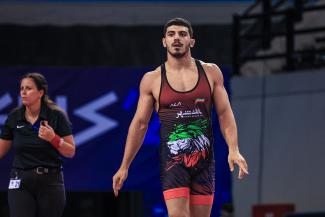
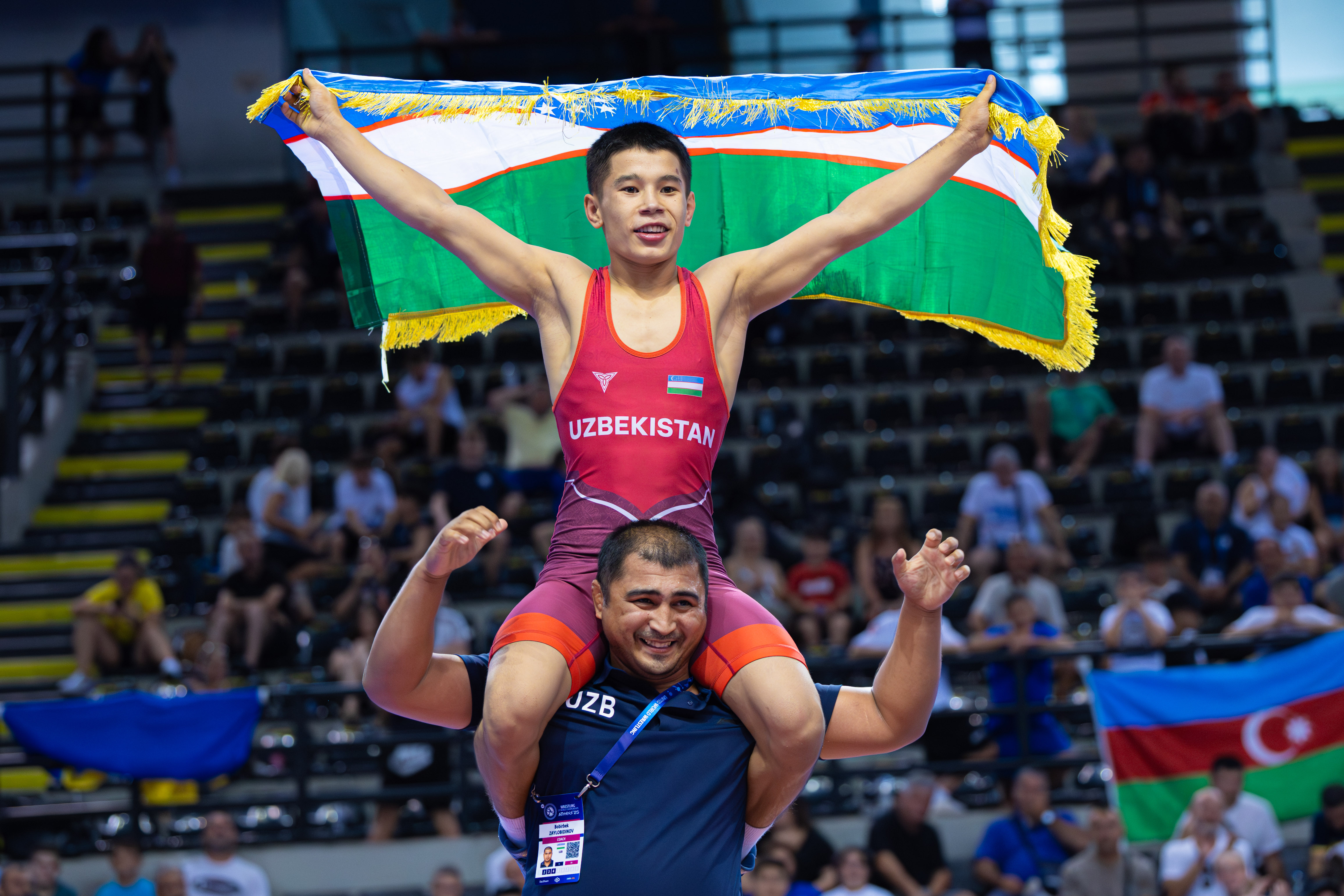
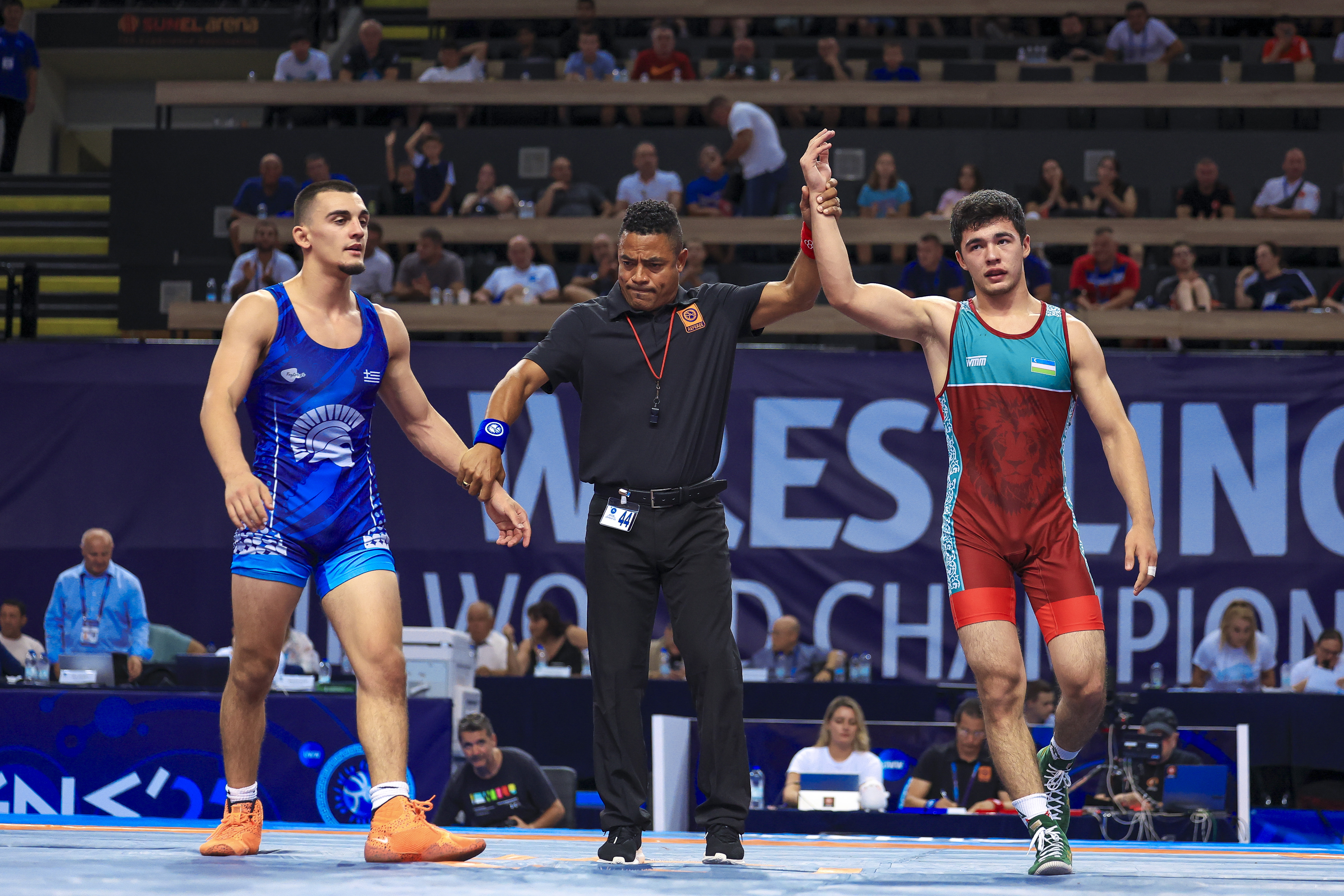
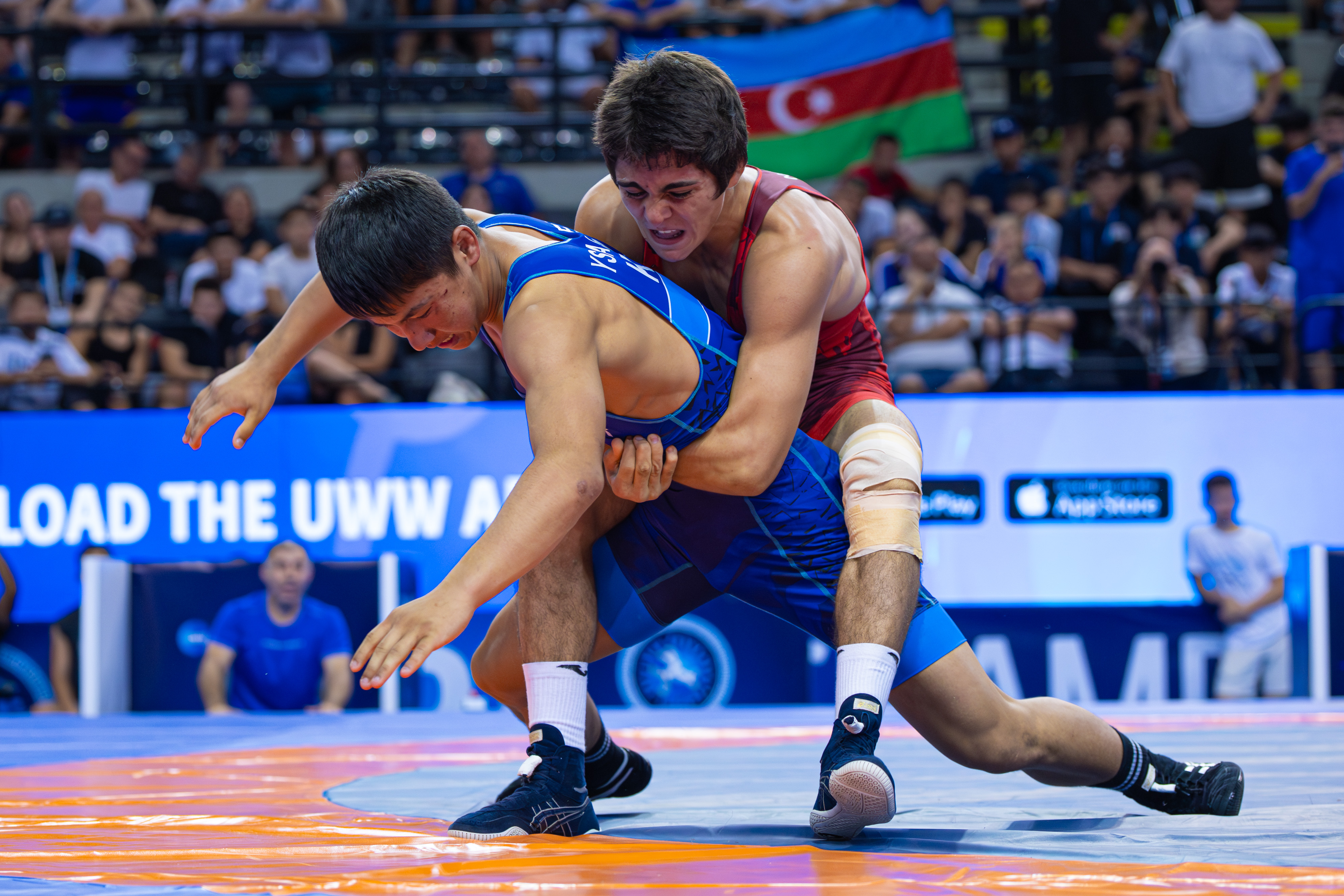

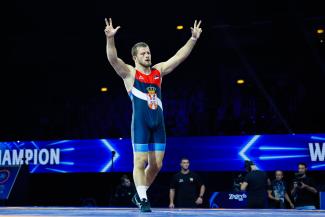
Share your thoughts.
Comments